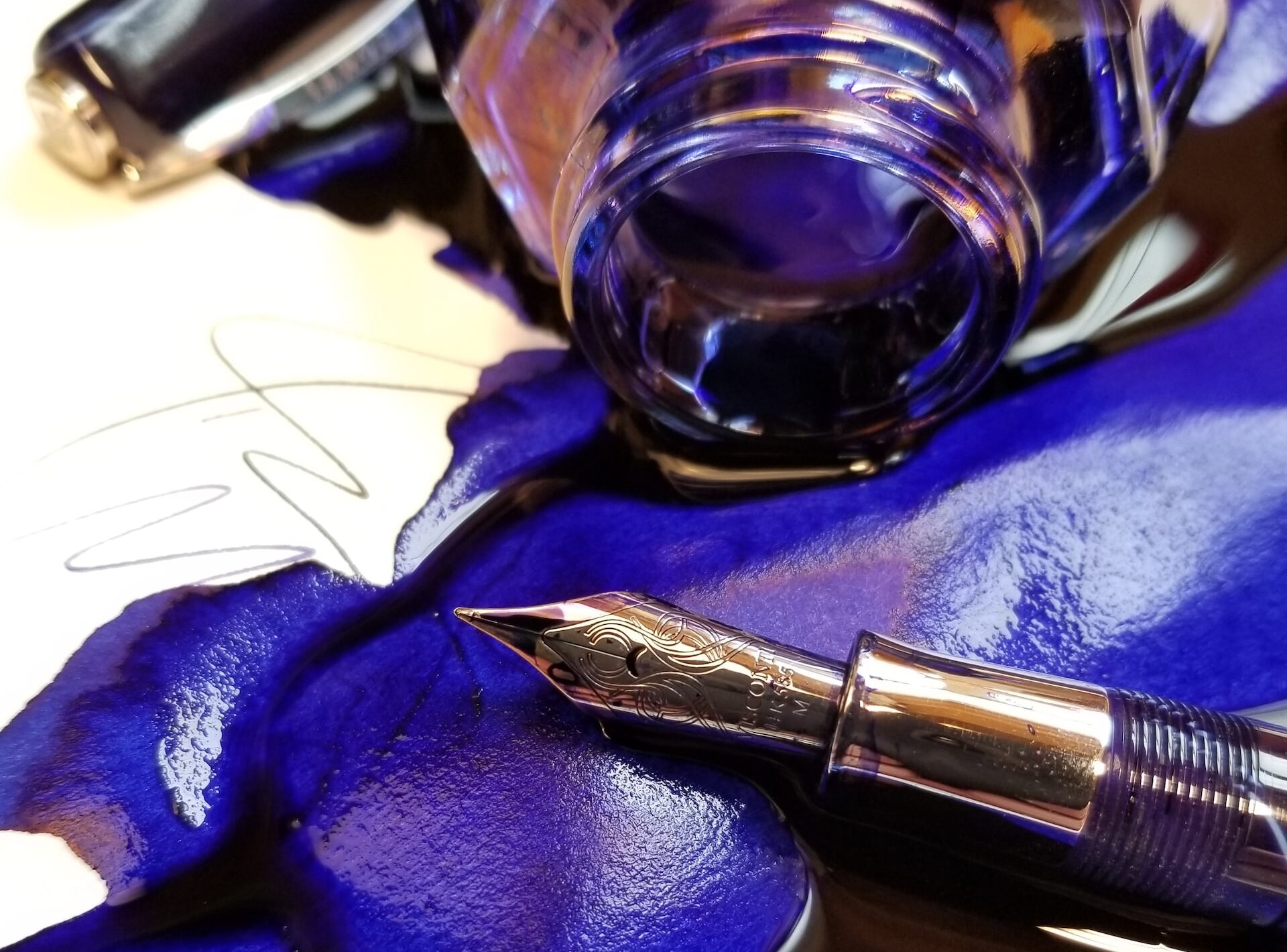by Luke W. Henderson
Thomas Mulligan finished lettering his dialogue with a dramatic flair viewed by no one but himself. Ink from his quill splattered onto the wall by the desk as he flicked his wrist. He made a mental note to inform Mrs. Parson later. She’d be all too happy to clean up after him. These little old lady bookshop owners always fawned over a writer in their midst. The idea of one residing in her loft and maybe, possibly, writing a story about her little old town delighted Mrs. Parson enough that Thomas only had to pay with one of his novels for a month’s stay. He figured it would be more than enough time for his masterpiece.
Thomas hadn’t lied when he said he was writing a new book, but the shop owner might have been less enthused if she knew his real project. On his recent trip to Europe, Thomas had been exposed to a new storytelling medium that he desperately wanted for himself. He boarded his boat to Louisiana invigorated and buzzing with ideas. Upon arriving in the States, he immediately got to work, drawing on what little he remembered from his boyhood education concerning paints and oils so he could recreate what he saw and truly make a name for himself.
The book was going to be entirely pictures, multiple scenes per page with scrolls emerging from the character’s mouths to display dialogue. The one Thomas had seen months ago was merely a single image and one line of speech, so he figured he could do it better. Bigger. The story was already crafted in his head, but he couldn’t seem to get his hands to cooperate for the pictures. Worse yet, the month Mrs. Parson had gifted was half over.
He had been toiling on this second page for weeks and reached the limits of his frustration an hour ago, but the weather was not suited for breaks today. It was hurricane season and everyone in town had shuttered their doors against the currently raging storm. Thomas had nowhere to go and nothing to do. He generally avoided talking to Mrs. Parson unless absolutely necessary, so he could either absentmindedly gaze at the storm through the window above her desk or stare at the blank pages that mocked him. Pushing through his struggle seemed to have worked in the end, the first image was complete and he quite liked the calligraphy that adorned this character’s speech scroll. His admiration was swiftly interrupted.
A raging gust of wind caused something hard to punch through the window. Glass shattered all over Thomas’ work. In a panic, he swiped his hands across the desk’s face, spilling his inkwell and cutting his writing hand.
“Blast!” he shrieked as his held his hand up to slow the bleeding. His gaze darted across the room for something to cover the wound, but found nothing suitable. He grabbed one of Mrs. Parson’s record books from the shelf beside him and ripped out a page as a makeshift bandage.
Cursing his situation, he rose from his chair and walked towards the door. “Mrs. Parson, I need a bandage and a new jar of ink. Quickly!”
Halfway to the door, Thomas’ foot collided with something hard and it clattered across the room. It was a dark-stained wooden box with a golden eye painted on the top. He looked at the box and then to his foot, noticing the shattered glass ended at his toes. Thomas wondered where the box had originated. Did someone forget to bring it inside? Trek the storm with it? Or God forbid, someone may have been fleeing with an ill-gotten good. He walked towards the box, picked it up and opened its lid, careful to keep the piece of paper covering his hand.
The inside was lined in scarlet velvet which held a closed inkwell and a jet-black feather quill. Thomas could see why someone might be trying to leave town with it. It had to be expensive or sentimental in some way. The quill was gorgeous and almost sparkled in the light. The ink didn’t have a stamp from any shop, so it could have been homemade.
“Nevermind the ink Mrs. Parson,” Thomas shouted. “Just the bandage will do!”
He carried the box over to the desk and cleared away the remaining glass, making sure to use his sleeve this time. To keep away any mischievous winds from the ink, he placed the box towards the edge with its lid still open. He tried to grab the quill while keeping the paper against his palm, but couldn’t get a solid grip. After a moment of staring at the priceless feather, he threw the blood-speckled paper aside and snatched it.
Thomas turned the quill over and back, getting a feel for its weight. Finding it satisfactory, he went to dip it into the inkwell and continue his work. Before the tip met the opaque liquid, a drop of blood from his hand fell into the jar.
He gave out a grunt of frustration. “I suppose my actual blood and sweat will be a part of this story then.” Swirling the red drop into the mix, he dipped and began drawing the lines of the next picture.
Nearly an hour later, Thomas straightened to stretch his back. The linework for the second page was complete, but with how exhausted he felt, he should have much more done. He placed the quill on the desk and noticed there were no bloodstains marring the soft obsidian barbs. Curious, Thomas picked it up and spun it around. There wasn’t a speck or splatter anywhere, but he had to be losing blood. His hands were like porcelain, his veins little blue cracks in the veneer. This was very strange, thought Thomas, but the linework was finally getting complete, so he continued.
He paused when he reached the inkwell and saw that it was as full as when he started. He’d been drawing for a while, surely, he’d dipped into the well enough times for it to be a little lower. A soft wind blew one of Thomas’ pages into his face. He grabbed it, but didn’t pull it away just yet. A smell of rust tickled his nostrils. Two deep inhales only made the smell stronger. Finally taking the paper off his face, he noticed that most of the linework was a different shade than the beginning of the page. Instead of crisp black, it was a dark brown.
Before Thomas could examine further, his hands seemed to act on their own and throw the page onto the desk. Though he tried to pull away, he felt compelled to lean over and begin drawing once more. His characters and scenes were being made faster than he had ever drawn. Page after page were whisked onto the floor as they became completed. His breath was racing and his body became weaker and weaker the more he drew. His head felt like a deflated balloon by the time he reached his last sheet of paper.
His head hit the desk while his hands finished the final scene of the story. His body began to slide down, leaving the chair and hitting the floor, but his hand was cemented in place. Thomas could feel his hand reach the bottom of the page and begin writing familiar letters:
B-Y-T-H-O-M-A-S-M-U-L-L-I-G-A-N.
As the last letter was penned, Thomas Mulligan fell the rest of the way to the floor. The black feather quill left his hand and floated into the air. Before it could begin swaying downward, a wind carried it out the window and into the storm.
Luke W. Henderson is a writer of poetry, prose, and comics whose work has been published in The Comic Jam, Orlok Lives, Corrupting the Youth and the upcoming anthologies Project Big Hype: Vol. 3, The Dark Side of Purity Vol. 3 (Band of Bards) and Comics from the Kitchen (Foreign Press Comics). They are also a comics reviewer contributing to Comic Book Yeti, and GateCrashers.



Add your first comment to this post